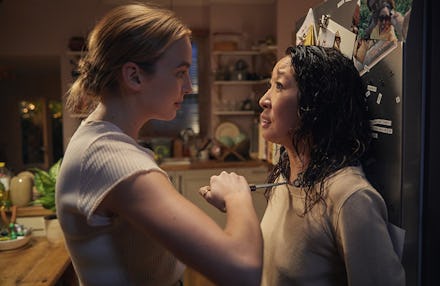The complex queerness of BBC America’s ‘Killing Eve’ is one of the best parts about the series

(Editor’s note: Spoilers for the TV series ahead.)
In the spectacular first season of the BBC America crime drama Killing Eve, there are several moments when it feels as though the two main characters are about to kiss. Eve, a low-ranking British intelligence official played with frantic likability by Sandra Oh, is chasing down Villanelle, an international assassin played magnetically by Jodie Comer.
At one point, Villanelle, having successfully snuck into Eve’s home, leans in to smell Eve’s perfume on her neck — a moment heavy with tension because it seems like Villanelle is about to either kiss Eve or kill her, or maybe both. The season finale, which aired Sunday, finds the pair in bed together in Villanelle’s Paris apartment in what feels like a natural conclusion to a relationship in which the two women are mutually obsessed with each other.
And — spoiler alert! — as Villanelle leans over to seduce Eve, who seems extremely seduce-able, Eve instead drives a knife into the killer’s abdomen. A different kind of intimacy, perhaps, than what either was expecting.
This complex relationship is the show’s most delightful exploration. Eve and Villanelle are obsessed with each other in a way that’s sexually charged but also not; they each want so much more than to be close to the other woman. They both want the power and the upper hand, but also to know each other fully. Their dynamic is queer, yes, but it’s not romantic.
Killing Eve, adapted from a series of novels by Luke Jennings, was produced and co-written by Phoebe Waller-Bridge, whose fantastically dark comedy Fleabag was a critical hit in 2016. As demonstrated in Fleabag, Waller-Bridge is, as a creator, intensely interested in the lives of women — their relationships with each other, their failings, their grave missteps. And Killing Eve is chock-full of rich women characters.
Even the show’s sidekick-type characters have their own pathologies and motivations. Eve’s coworker Elena (played by Kirby Howell-Baptiste), for example, offers some comic relief in her far-too-brief appearances — but she’s also a real character, prone to sex with her ex and burying her grief. Eve’s mysterious new boss, Carolyn Martens (played by Fiona Shaw), is both ice-cold and flustered, with plenty of secrets of her own.
But the most interesting relationship by far is the one between Eve, a dissatisfied office drone working in British intelligence who longs for more exciting work in the field, and Villanelle, a chameleon of a woman whose charm, looks and ruthless sociopathy have allowed her to succeed, undetected, as a deadly assassin.
As Waller-Bridge told Into in an April interview, she intended for the relationship between Eve and Villanelle to feel a little like a love affair.
“There’s so many things going on when they first meet each other,” Waller-Bridge said. “That was something that was really important — that’s the show for me. There’s this thriller going on but underneath, there’s this relationship between these two women. And when they lock eyes with each other in the first episode, I decided that was the moment — it was love at first sight. It was a connection, whether they knew what it was. I think Villanelle was very attracted, and I think she’s not in that headspace, but Eve feels the same and that’s their first instinct.”
And what’s perhaps most exciting about Eve and Villanelle’s relationship is that it can’t be pinned down. The occasional moments of levity or sweetness between them add depth to what could easily otherwise be a more one-note dynamic.
One of the many ways in which Killing Eve subverts the cat-and-mouse genre is that it throws the women together in the same space early on in the series. Their first interaction is in a bathroom, when neither knows who the other is yet; Villanelle casually advises Eve to leave her hair down, telling her it looks better that way. Anyone who’s spent time in a women’s bathroom knows this type of interaction, this tenderness between women who are strangers, is both commonplace and special. But for Eve and Villanelle, it’s a sort of meet-cute that leads them down a long road of obsession.
Over the course of the series, their feelings for each other and the intimacy with which they hunt each other down only intensify. Villanelle steals Eve’s clothes and wears her scarf. Eve applies the perfume Villanelle sends her. In the final episode, Eve’s confession to Villanelle about how much she thinks about her sounds a lot like a confession of love at the end of a rom-com.
It’s worth mentioning that Villanelle’s character is explicitly queer. She sleeps with men and women, at one point coaxing a middle-aged American tourist into role-playing as Eve while they have sex. But Villanelle and Eve’s relationship is more complicated than just attraction. It’s the kind of fierce feelings that develop between women who aren’t sure whether they want to be with each other or be each other.
That’s precisely why it would have been disappointing if the season finale had Eve and Villanelle actually sleep together. That would have been far too neat a conclusion for their relationship. Instead, they seem poised to continue to chase each other around Europe — a season two has already been confirmed — and the ambiguity of their relationship, now that one has actually wounded the other, can only deepen from here.